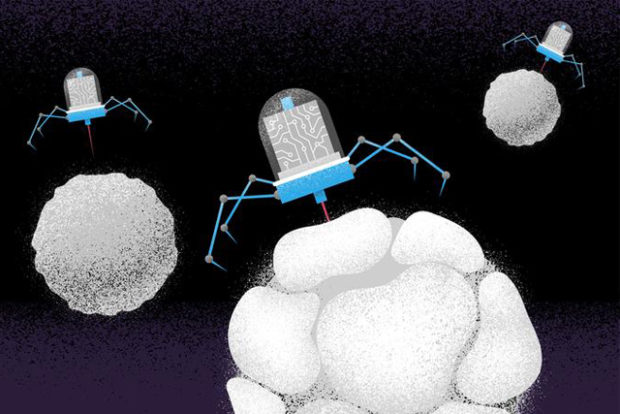Genetics and Intelligence
Robert Plomin on IQ tests, genetic predispositions to higher or lower intelligence, and the Flynn Effect
videos | August 28, 2017
The video is a part of the project British Scientists produced in collaboration between Serious Science and the British Council.
One of the areas of research I study is genetics and intelligence. It’s one of the oldest studied questions in behavioral genetics going back to the late 1800s with Francis Galton here in England. He was a cousin of Darwin, for example, a gentleman scholar, he did his research in his home and that sort of thing. He did some of the first work on intelligence and he did it very badly. He studied reputation, people who were thought to be very intelligent. But what happened in the early 1900s was people developed measures of intelligence. Even now that’s contentious for some people, but I think it’s very well-measured. It began with Spearman, Charles Spearman, in England in 1904 where he said, “intelligence just means too many different things to different people and what do you mean by intelligence really?” He said, “I’m going to define it precisely: g – general cognitive ability”. And what that is what diverse tests of cognitive ability have in common.
You’ve got hundreds of tests of cognitive abilities, like different types of memory, different types of verbal, vocabulary fluency, spatial ability – there’s many different types of cognitive tests, but they all correlate substantially, which is quite surprising to people. You know, if you are good in verbal, it means on average you’re probably pretty good in memory, pretty good in spatial. People say, “Oh no, I’m good at spatial, I’m not good at verbal” and vice versa. But they are pretty good, they just mean they’re better at this than that. They correlate substantially, so that 40% of the variance the individual differences of all those tests are in common. That’s what we mean by G – the overlap, the covariance among all these tests.
It isn’t a thing, it’s what these tests have in common. So, intelligence tests, the major ones used around the world, have about 10 different tests. They’re different: some are verbal, some are non-verbal tests. They are diverse tests and what you do is you put them together to get a score that people usually call an IQ-score. It’s a pretty good measure of general cognitive ability. So, general cognitive ability is important, because it’s the best predictor of societally important things, like educational outcome and occupational status by far than anything else we have. They’re also among the most heritable tests.
Neuroscientists are becoming very interested in intelligence as well, because it’s how the brain works, it’s how the brain functions. And it doesn’t function in the way most neuropsychologists think as little modules in the brain that light up when you do functional MRI. The brain works, it evolved as a general problem-solving tool. It uses everything it’s got to solve a problem. Some of the tests that correlate most with this concept of G are like abstract reasoning, problem-solving in novel situations. And I think, people just see that, they just say, “who do you think is intelligent, why do you think they are intelligent”, it probably has to do with stuff like this. It’s not just how good you are on these quiz shows like here in England called University Challenge, where you just memorize a lot of facts. That isn’t really what we mean much by intelligence, although to be good at that you have to be fairly intelligent.
I mentioned this, I emphasized this, because some people that say, “Oh what’s intelligence?”, well, it’s one of the best measure things we have, it’s one of the most important predictors we have, it’s an important trait ,it’s basically learnability. In terms of education, which I particularly study, some kids learn more easily than other kids. Any teacher will tell you that. But instead of assuming it’s all environmental, we got to ask – is it genetic?

You first explain what heritability is. That’s the extent to which differences are due to genetic differences. You ask them, “Okay, would heritability increase or decrease?”. People will say it decreases. Why? Because Shakespeare’s slings and arrows of outrageous fortune, environmental differences, accidents, illnesses – they all pile up, which means that increasingly, as you go through life, the differences you see ought to be due to the environment. But instead it’s very much the other direction. This has been replicated in many studies, it’s a really solid finding that heritability of intelligence increases.
If you ask why does this happen, and it’s what I was talking about before that, the way genes work is they don’t program intelligence test scores in our DNA, it allows you to learn more easily. You can learn more difficult subjects and then you choose environments that fit that, you like to learn difficult things. So, you read different difficult things, you argue with people, you talk to people who want to discuss intellectual issues, and so you create environments correlated with your genetic propensities. The little differences early in life accounting for 20% of the variance, say, in infancy snowball, they increase as you go through life selecting and creating environments correlated with your genetic propensities. That’s why I think the heritability of intelligence increases throughout life, and I’m particularly interested in applying these techniques to education.
Psychology about 20-30 years ago, they didn’t accept genetics at all. Now it’s very dumb, everyone accepts genetics. Education, however, is this backwater where they don’t accept science by and large. You spend as much money on education as we do on the National Health Service. In the National Health Service, if you have a new idea, a new program, you’ve got to show empirically that it works, you have to do randomized control trials. In education people just use their hunches, and you see so many examples of this. I think they’re going to have to deal with evidence and prove empirically, scientifically that their programs work. And then, I think, they will take genetics seriously. Right now they just say: “Oh well, that’s just research and science. That doesn’t have anything to do with education”. It’s bizarre, because we find that cognitive traits and educational achievement are among the most heritable traits.
The kids in England are the most tested kids in the world. They have these national curricula and national tests that they take at different stages in education. We find in the first year of school literacy, numeracy, the things we teach at schools are about 65% heritable. The differences among kids even as they go into school are very substantially due to genetic differences. The heritability of intelligence goes up. In the first few years of school, the heritability of school achievement, these test scores is higher than the heritability of intelligence. Then as the inheritability of intelligence goes up, it becomes about on a par with heritability of educational achievement.
There are a lot of interesting things that we find: educational achievement is just as heritable for what we call STEM-subjects (science, technology, engineering, math) as it is for Humanities, for example. We also find that a lot of the genetic influence overlaps. It’s not just separate genes for learning math and separate genes for learning English – it’s largely the same genes, and substantially that’s what we call intelligence. It’s the same genes that affect all these different aspects of educational achievement.
When we talk about intelligence it’s important to recognize that we’re looking at individual differences – why people differ on intelligence or educational achievement. That’s not to be confused with questions about why are humans more intelligent than other species or are we on average more intelligent than people were before. However there’s quite a bit of interest in the issue of intelligence increasing. That’s called the Flynn Effect. He first noticed this, it has been quite a big increase in intelligence over the last few decades. It seems to have tapered off. Nobody knows exactly what that’s about: is it that we’re becoming more sophisticated about test-taking, is it the way we standardize these tests. So, it’s not really clear.

It’s interesting to think about this on the environmental side. We’re not talking about the average now, we’re talking about heritability – that genetics accounts for a lot of the differences we see in intelligence. So, what if you were able to make a more equal society, what that means is you get rid of the environmental differences, you stop privilege, stop parents passing on their wealth to their kids for example and giving them educational opportunities that other kids don’t have. If you can get rid of the environmental differences, you don’t get rid of the genetic differences. The heritability increases with equal environments, and that means that actually heritability is an index of social mobility, of equality.
What’s important about heritability, which is the extent to which genetic influences explain behavioral differences, we call it observed phenotypic differences. We’re talking about it in a particular population at a particular time with a particular mix of genetic and environmental factors, we’re describing what is what exists, not what could be. But now suppose those conditions change, as they could change over time in a population or between different populations. So, say in a Mad Max apocalyptic world where the environments are completely different, how will that change heritability. It certainly could change it, it could actually make it greater, because the genetic differences are more important. I mean the life or death issues that you solve, all these new problems that you’re confronted with, you can’t just coast on automatic pilot, the way we can in our you know relatively civilized world, where we know what’s going to happen, we’re not too often surprised, so it’s hard to know in the future in terms of possible environments, what would happen. But what we do know is if you equate the differences in environments, you actually increase heritability. And I think that’s a really interesting notion in terms of equality of opportunity and suggesting that heritability is an index of equal environments.





























